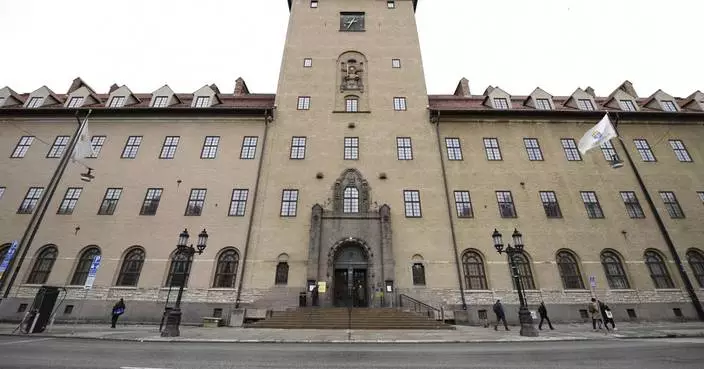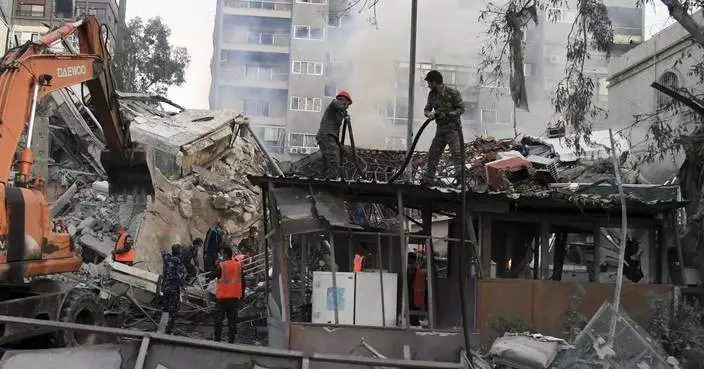Government forces and their allies must allow humanitarian corridors into conflict areas in northwest Syria, the U.N. human rights chief said Tuesday, adding it was "cruel beyond belief" that civilians live under plastic sheeting in freezing conditions while getting bombed.
Michelle Bachelet's comments came a day after Syrian President Bashar Assad pledged to press ahead with a military campaign in the northwest. His troops have been making rapid advances against rebel-held areas, sending hundreds of thousands of people fleeing for safer areas. Assad congratulated his forces for the gains, vowing complete victory “sooner or later.”
More than 900,000 people have been displaced from their homes since the beginning of December, according to the U.N. Those include some half a million children, according to Henrietta Fore, executive director of the U.N.'s children's agency, UNICEF.
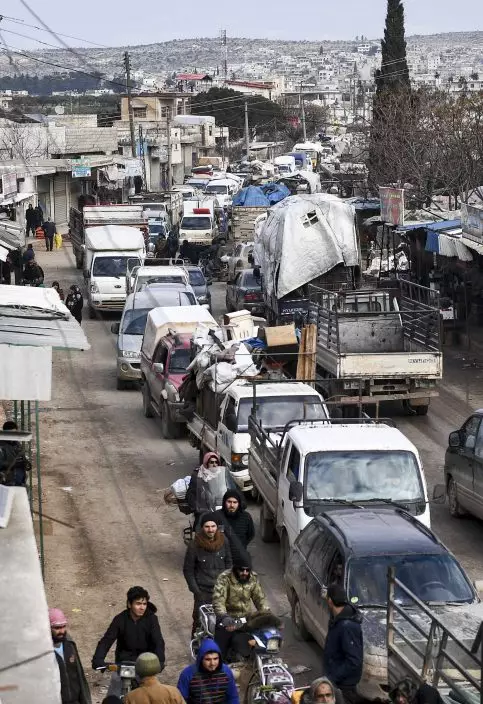
Civilians flee from Idlib toward the north to find safety inside Syria near the border with Turkey, Saturday, Feb. 15, 2020. Syrian troops are waging an offensive in the last rebel stronghold. (AP Photo)
"Entire families, some who have fled from one corner of Syria to the other over the course of the past decade, are tragically finding that bombs are part of their everyday life," said Bachelet. "How can anyone justify carrying out such indiscriminate and inhumane attacks?"
Bachelet urgently called on all parties to the Syrian conflict, including state and non-state actors, to immediately cease hostilities and ensure the protection of all civilians. The U.N. Human Rights Office recorded 298 civilian deaths in Idlib and Aleppo, where the government offensive has been concentrated, since Jan. 1.
It said 93 percent of those deaths were caused by the Syrian government and its allies. In addition, 10 medical facilities and 19 educational facilities were either directly hit or affected by strikes close by, the U.N. office said.
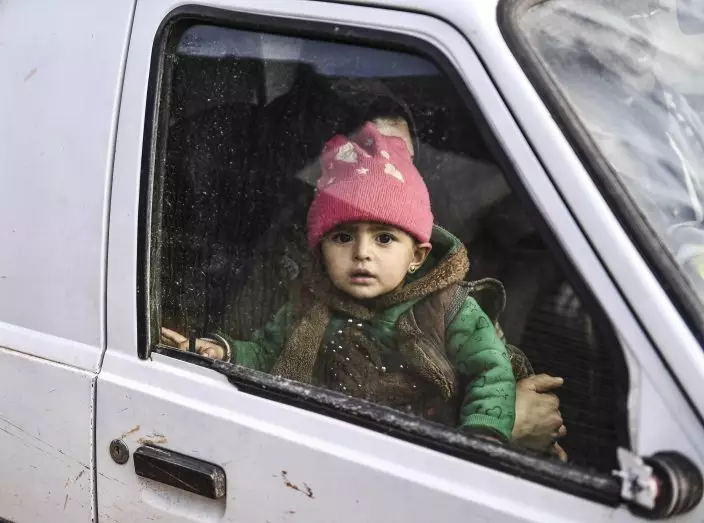
Civilians flee from Idlib toward the north to find safety inside Syria near the border with Turkey, Saturday, Feb. 15, 2020. Syrian troops are waging an offensive in the last rebel stronghold. (AP Photo)
Syrian opposition activists reported airstrikes on several rebel-held areas on Tuesday, including the outskirts of the town of Atareb and Daret Azzeh.
"No shelter is now safe," said Bachelet. "And as the government offensive continues and people are forced into smaller and smaller pockets, I fear even more people will be killed."
She said displacement camps are overwhelmed by the sheer number of people seeking shelter, and there is limited access to food, clean water and medical care. Many fearing for their lives have fled the camps, braving harsh weather conditions and subzero temperatures, and taken their chances on the road.
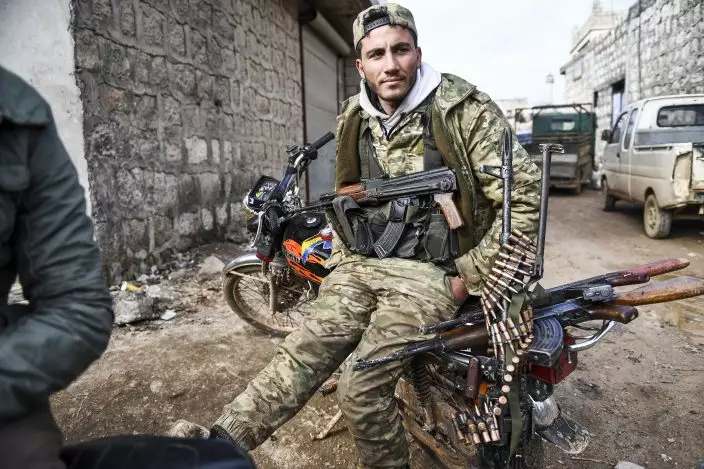
Syrian rebels sit outside Idlib, Syria, Saturday, Feb. 15, 2020. Syrian troops are waging an offensive in the last rebel stronghold. (AP Photo)
Bachelet called on the Syrian government and its allies to allow humanitarian corridors into conflict areas, and to allow for the safe passage of civilians.
Fore, UNICEF's chief, said "children and families are caught between the violence, the biting cold, the lack of food and the desperate living conditions. Such abject disregard for the safety and well-being of children and families is beyond the pale and must not go on."
BEIRUT (AP) — Amnesty International said Wednesday it has documented widespread abuses, including torture and deprivation of medical care, in detention facilities holding thousands of suspected Islamic State members and their relatives in northeast Syria.
The centers and camps hold about 56,000 people — the majority of them children and teens — and are run by local authorities affiliated with the U.S.-backed, Kurdish-led Syrian Democratic Forces. The SDF and its allies, including U.S.-led coalition forces, defeated the Islamic State group in Syria in 2019, ending its self-proclaimed Islamic “caliphate” that had ruled over a large swath of territory straddling Iraq and Syria.
What to do with the suspected IS fighters and their families has become an intractable issue. Many countries whose citizens traveled to Syria to join IS have been reluctant to repatriate them, as have local communities in Syria.
"People held in this system are facing large-scale violations of their rights, some of which amount to war crimes,” Nicolette Waldman, Amnesty’s senior crisis advisor, told journalists.
The United States is also responsible for the alleged violations because it played a key role in establishing and maintaining the detention system, providing hundreds of millions of dollars to the SDF and affiliated forces and regularly interrogating detainees, Waldman said.
The human rights group interviewed 126 people accused of IS affiliation currently or formerly detained, along with representatives of the local administration and aid workers.
The Amnesty report said the vast majority of detainees are being held “indefinitely, without charge or trial, in violation of international human rights law and international humanitarian law,” while those who have been tried were, in many cases, convicted on the basis of confessions extracted under torture.
The alleged abuses include “beating, stress positions, drowning, electric shocks and gender-based violence,” including a male detainee who said he and others had been sodomized with broomsticks by guards, the report said. Detainees were also deprived of food, water and medical care and subjected to extreme cold and heat in overcrowded cells, with some allegedly dying of suffocation, it said.
The report added that many of the approximately 14,500 women and 30,000 children held had been victims of human trafficking, including women who were forced to marry IS fighters and minors who were forcibly recruited by the group, and that local authorities had failed to set up a “mechanism to identify trafficking victims” and protect them.
The report also criticized the practice of forcibly separating adolescent boys — some as young as 11 or 12 — from their mothers and placing them in rehabilitation centers indefinitely.
Amnesty called on local authorities, the U.S. government and other allies to bring the detention system into compliance with international law and urged the United Nations to work with them to establish a screening process to release all who are not “reasonably suspected” of having committed a serious crime.
The Autonomous Authorities of the North and East Syria Region, the civilian administration affiliated with the SDF, wrote in response to the Amnesty findings that it had not received any official complaints regarding torture in detention facilities and “if this happened, they are individual acts.”
The administration said it would take action against employees who committed violations if evidence is provided. It denied allegations that inmates were deprived of food, water and medical care. It acknowledged overcrowding in the facilities, which it attributed to lack of financial resources to secure larger centers.
The local authorities took issue with the allegation that people were arbitrarily detained, asserting that most detainees “are members of a terrorist organization and were arrested during the battles" and that many had committed crimes against humanity and war crimes.
The U.S. State Department said in its own response that “we share many of (Amnesty’s) concerns” and it has been working to address them. It called on the international community to “aid local entities’ management of these challenges” and for countries with citizens held in detention in Syria to repatriate them.
Waldman said she believes Washington "very likely knew about these poor conditions from the beginning."
She added: “We think that it may not be the case that they are doing everything they can. They need to accept a much greater responsibility, especially since they played such a key role in establishing the situation in the first place."
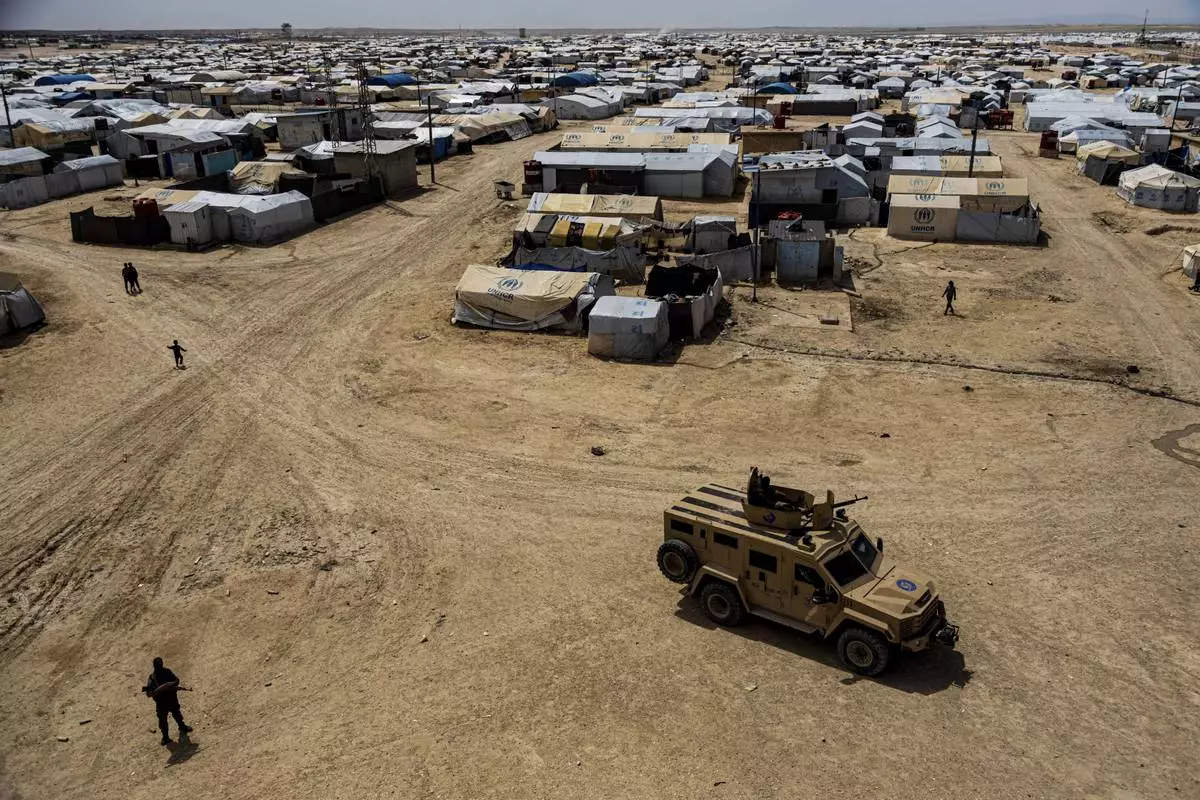
FILE - Kurdish forces patrol al-Hol camp, which houses families of members of the Islamic State group in Hasakeh province, Syria, on April 19, 2023. Amnesty International said Wednesday, April 17, 2024 it has documented widespread abuses, including torture and deprivation of medical care, in detention facilities holding thousands of suspected Islamic State members and their relatives in northeast Syria. (AP Photo/Baderkhan Ahmad, File)
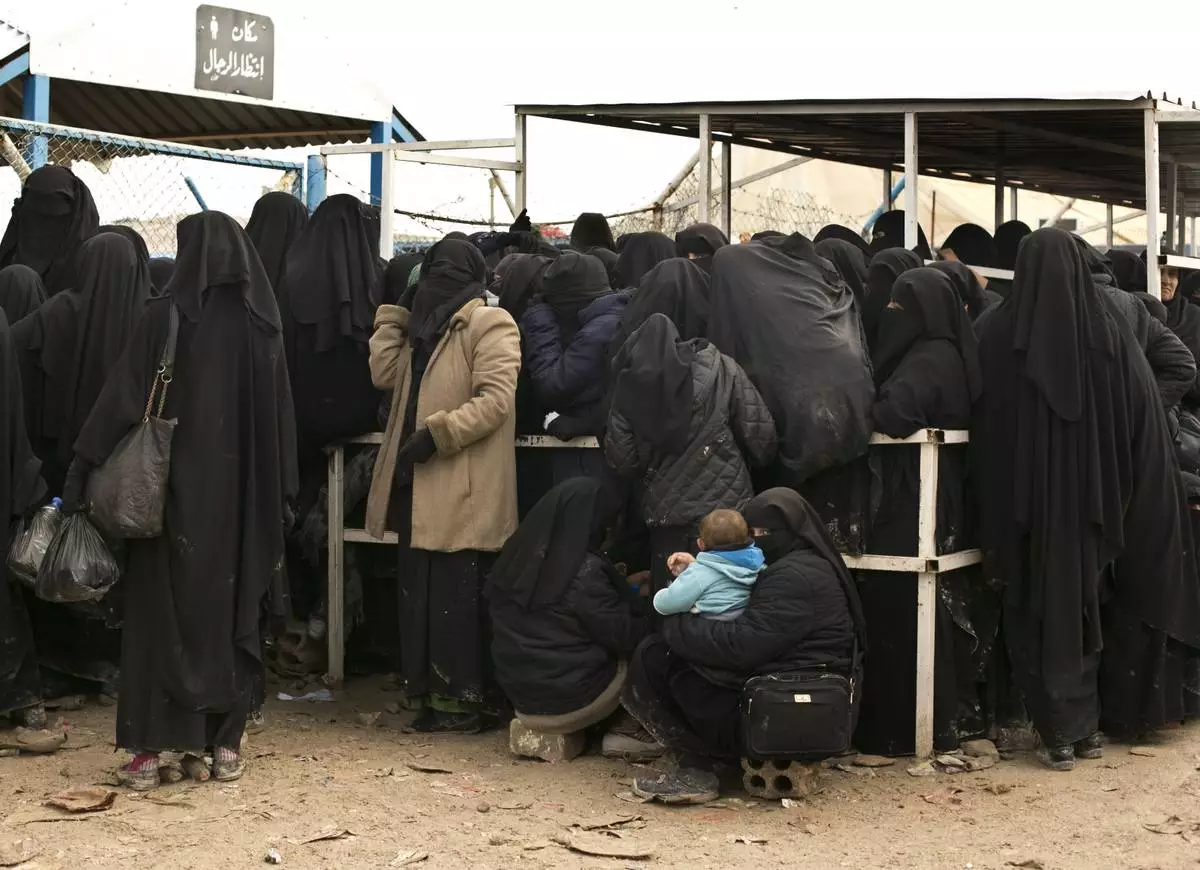
FILE - Women residents from former Islamic State-held areas in Syria line up for aid supplies at Al-Hol camp in Hassakeh province, Syria, March 31, 2019. Amnesty International said Wednesday, April 17, 2024 it has documented widespread abuses, including torture and deprivation of medical care, in detention facilities holding thousands of suspected Islamic State members and their relatives in northeast Syria. (AP Photo/Maya Alleruzzo, File)










